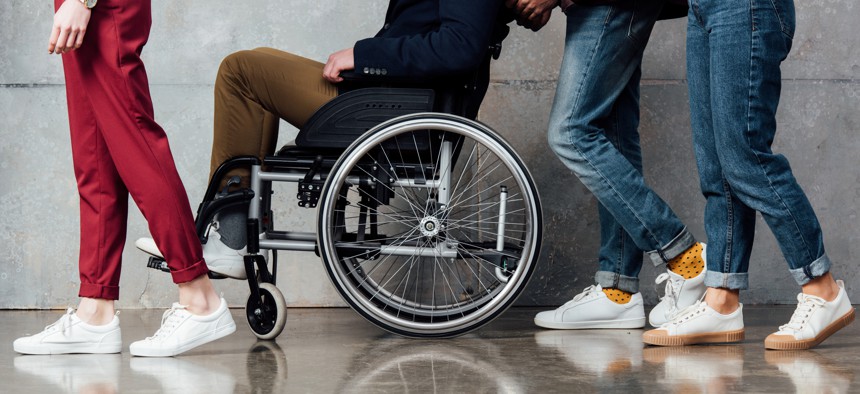Inclusive innovation spurs equity, self-sufficiency

LightFieldStudios/Getty Images
As local governments test out the latest technologies, they are ensuring vulnerable populations are not left behind.
As state and local leaders experiment with emerging technologies that boost government efficiency, leaders should ensure the services they acquire lift everyone up.
For instance, Arlington, Texas, is upgrading its on-demand self-driving transportation service Arlington RAPID with roomier, wheelchair-accessible autonomous vehicles, officials recently announced. RAPID’s four Lexus SUVs and one wheelchair-accessible Polaris GEM will be replaced with five Toyota Autono-Maas minivans, Transportation Planning Manager Ann Foss said. Officials are still deciding how many of the minivans will be wheelchair accessible.
The Toyotas will ensure all riders have the same experience, rather than wheelchair passengers being limited to one specific vehicle.
The North Central Texas Council of Governments is expected to provide funding for the rideshare program for two years. “Public transportation is a public good. The government is helping to provide this service for people who need it,” Foss said.
By building up Arlington RAPID to make it more accessible to disabled and elderly residents without their own means of transportation, the city is providing all residents an equal opportunity to commute to work or school as well as age in place and remain in the community, Foss said.
The program also offers flexibility as residents can still use the city’s paratransit service to schedule rides at specific times. For instance, an individual may have regular dialysis appointments they need to attend, Foss said, so they can rely on the paratransit service to preschedule rides. However the individual may not know when the appointment will end, which is where the on-demand rideshare option comes into play. “They’re supplements to each other,” she said.
The Windy City is also exploring how innovative tools can serve disabled individuals. The Mayor’s Office of People with Disabilities (MOPD) is conducting a pilot program to increase food accessibility for homebound residents.
In partnership with the Community Safety Coordination Center and the Thierer Family Foundation, Chicago is using a platform developed by Vivery, a digital network of food banks, to connect vulnerable residents with resources to combat food insecurity. Residents in Chicago’s Austin neighborhood can use the platform to schedule monthly in-home food deliveries provided by nearby pantries and community produce suppliers, according to MOPD.
The delivery technology helps food providers “identify the most efficient routes to reach those individuals, saving time and increasing capacity, and recipients can get a level of personal support they didn’t have previously through this high-touch delivery service,” city officials said.
In Pennsylvania, the Allegheny Regional Asset District is focusing funds on bringing accessibility to the arts. In 2020, RAD gave the nonprofit named City of Asylum $20,000 to provide audience members with a SoundShirt system. The haptic wearable vibrates and lights up in response to auditory stimulation to help hearing-impaired individuals experience music.
In 2022, RAD provided $7,000 in funds for the Prime Stage Theater to make its website compliant with the Americans with Disabilities Act. The site revamp included assigning alternative tags for images, implementing keyboard accessibility and adjusting website design so that color schemes are more accessible for visually impaired individuals.






